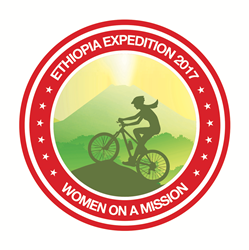On November 2017, our independent, self-funded, team of 12 women, from Singapore, Manila, Hong-Kong and Cape Town, under the banner of Women on a Mission (WOAM), a non-profit organisation headquartered in Singapore which supports and empowers abused women, will embark on a two-week Mountain Biking Expedition on November 10, 2017, to the Danakil Depression of Ethiopia, in support of women survivors of war.
It wasn’t enough that last November 2016, the WOAM team went to the actual hottest place on earth, the Lut Desert of Iran; the Danakil Depression ups the ante a little because it is considered to have the hottest average year-round temperatures on Earth, reported to be 35 degrees Celsius. Worse, it receives just 100 to 200mm of rainfall per year and is also one of the lowest places on the planet, at 410ft (or 125m) below sea level. Combined, these factors make it one of the most inhospitable environments in the world.
The Danakil, also known as the “Gateway to Hell” is one of the most surreal and alien-looking landscapes imaginable. Located in the Afar Region of northeast Ethiopia near the border of Eritrea, it is part of the East African Rift System, a place where the Earth’s internal forces are currently tearing apart three continental plates, creating new land. The Danakil is also famous in the scientific community for being the location where the infamous 3.2 million year old hominid fossil “Lucy” was found, and the area has since been dubbed “The Cradle of Hominids”.
Luminescent yellow and green ponds dominate the region, where boiling hot water and poisonous sulphur gases bubble up to the surface and choke the air. There are two highly active volcanoes: one of them, Erta Ale, is one of only a handful of volcanoes to have an active, bubbling lava lake at its summit. The area is littered with geysers and features a deep crater called Dallol. The hot and dry climate means that very few plants or animals can survive there. The conditions in the Danakil can only be described as cruel, but against all odds, people do live there. In fact, the Afar people call it their home and have settled nearby in a semi-permanent village called Hamadela.
No one has ever attempted the crossing of the Danakil Depression on bicycles before. The terrain and conditions are completely unknown to the women cycling across it. However, the team is up for this once-in-a-lifetime challenge, which will be WOAM’s 8th expedition to date.
The expedition’s objective is to raise $100,000 SGD for Women for Women International – an independent humanitarian organisation, which provides women survivors of war, civil strife and other conflicts, with the tools and resources to move from crisis and poverty to stability and self-sufficiency.
Brita Fernandez Schmidt, Executive Director of Women for Women International UK stated, “The women we work with live in some of the world’s most dangerous places – it can be hard for us to imagine their daily challenges. I find it so inspiring that WOAM push themselves far outside their comfort zone in order to raise money and awareness for women survivors of war. Each trek they take on is just as challenging as the last, and WOAM members truly go the extra mile to leverage their networks and raise incredible sums of money, which make a real difference to the women we serve.”
WOAM, now in its fifth year of operation, has managed to raise $800,000 Singapore dollars to date, to support organisations that advance the position of women around the world. In addition to Women for Women International, the team also champions and raises funds for the following Singapore-based charities: AWARE - Singapore’s leading gender equality advocacy group; UN Women; Aidha - a Singapore NGO empowering domestic workers; and Pertapis Home for Women and Girls.
For this next expedition to Ethiopia, we will begin our voyage in the Ethiopian capital of Addis Ababa. Ethiopia is home to a truly diverse landscape and peoples. It is the second oldest Christian nation in the world and remains the only country in Africa that has never been colonised.
After one night in Addis Ababa, we will fly to Mekele, the capital city of the northern Tigray Region of Ethiopia and transfer by 4x4 to Hamedela, a village in the Dallol area of the Afar Region, set at an elevation of 92m (302ft) below sea level. Then from there, we will begin our bike trip across the Danakil Depression.
We will be biking between 30 to 50km a day, crossing sulphur/salt lakes and thermoactive springs, acid pools and colourful rock formations, as well as camping on the crater rims of volcanoes, within spitting distance of boiling lava, including the world’s only permanent lava lake, as well as travelling along sections used by the salt caravans, meeting local traders on the route.
The journey will also take us in the vicinity of many volcanic summits, such as Erta Ale, (613m), Alu (429m), Dalaffila (613m), Borale Ale (668m), Ale Bagu (1031m) and Afdera (1295m). So in addition to what will be an impressive and challenging crossing of the Danakil, we will also look at trying to reach the summits of some of these volcanoes wherever feasible.
After completing this epic crossing of the Danakil, we will then fly to neighbouring Rwanda, a country trying to recover from the ethnic strife that culminated in government-sponsored genocide in the mid-1990s, which killed an estimated 800,000 people in 100 days. The objective of this visit is to see first-hand where the funds raised by this expedition will be used and how Women for Women International’s holistic one-year programme works to help women who have suffered from the atrocities of war get back on their feet and become self-sufficient. We also plans to conduct leadership development and entrepreneurship workshops at the Women for Women International facilities in Rwanda so as to share our own diverse life and career experiences with the women we meet. By travelling in such challenging conditions, WOAM hopes to bring international attention to the need for societies, governments and corporations to get involved and help end violence against women. The team feels passionately that this reality can no longer be tolerated, in any form, in any context, and by anyone around the globe.
Ultimately, WOAM’s objective is to inspire women to want to leave their comfort zone, their families and homes for a certain period of time, while pushing their limits in an effort to rally support for a worthy cause. At the core of our culture is a passion for adventure and a deep respect and love of nature. We seek to travel and explore the world, and as a result make new discoveries, flourish as individuals, but most importantly, to contribute to society by championing the cause of abused women around the world.
FIND OUT MORE
About WOAM
WOAM is a non-profit organisation headquartered in Singapore, which combines challenging, self funded, expeditions and treks to remote and majestic locations around the world, with inspirational fundraising events and workshops in Singapore and abroad, to raise awareness and funds for women survivors of war and to support and empower women who have been subjected to violence and abuse. WOAM’s strategy is to organise and promote yearly campaigns and challenging expeditions – that are self-funded by each participant - to increase visibility, and to raise money for specific charities. WOAM partners with existing established non-profit institutions that already have well run programmes and structures in place dedicated to serving the underprivileged with a particular focus on women's issues. http://www.womenmission.com
About Women for Women International (WfWI)
Since 1993, Women for Women International has worked with more than 462,000 women in post conflict countries including Rwanda, Afghanistan, Democratic Republic of Congo and, last year, they launched a new pioneering programme assisting Syrian and Yezidi women refugees and internally displaced Iraqi women in the Kurdistan Region of Iraq by partnering with local organisations on the ground.
Women for Women International envisions a world where no one is abused, poor, illiterate or marginalised; where members of communities have full and equal participation in the processes that ensure their health, well-being and economic independence; and where everyone has the freedom to define the scope of their life, their future and strive to achieve their full potential.
That is why they work with the most marginalised women survivors of war, in a carefully designed and tested one-year core programme, to provide support and safety networks. The women in their programme can choose a vocational skill to learn and receive business training, so they can earn a living; they are educated on their legal rights and how to fight of those rights in their homes, their communities and their nations. Programme graduates report that strengthened self-confidence and solidarity with women and others in their communities help to sustain changes and build a peaceful, sustainable future. http://www.womenforwomen.org.uk
Team Profiles
The team of this 'Women on a Mission' Expedition to Ethiopia 2017 is formed by 12 intrepid women of diverse nationalities and backgrounds. While they are all incredibly well accomplished in their careers, they are equally passionate about supporting charitable causes and helping the less privileged.











